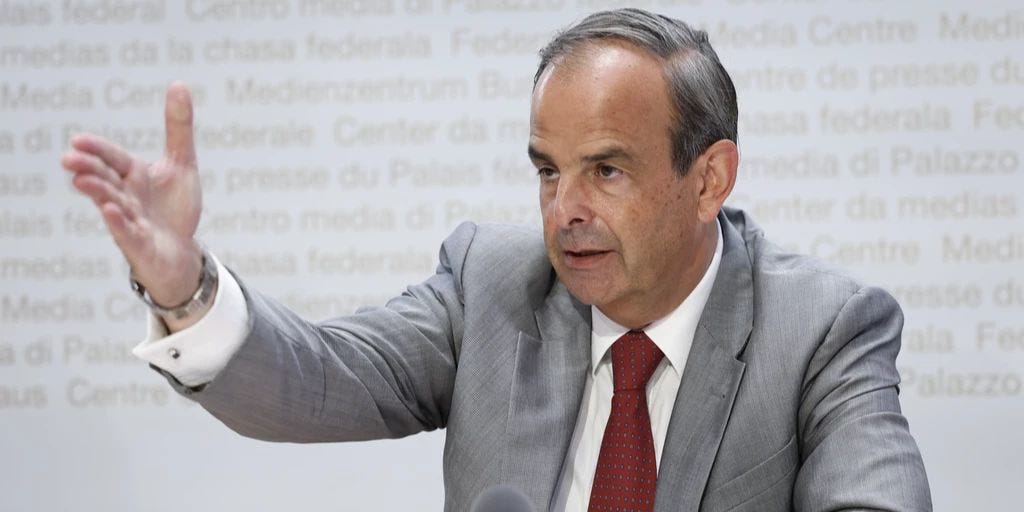Dear Insider,
One up and one down.
That is the picture in Swiss politics these days as Alain Berset winds down his term on the Federal Council under a (small and very Swiss) storm of criticism for media leaks during the coronavirus pandemic.
Meanwhile, the man in the middle (literally), Gerhard Pfister, seems to be playing the long game after his party’s jump vote share.
That is usually the way to make things happen in Switzerland - do less.
A (real) recipe for success…?
People in the news
Filippo Leutenegger - the former FDP National Councillor and current Zurich City Councillor, was elected as the new leader of the Zurich FDP, with a task to guide the party out of its current difficulties. The party recently lost its Standerat seat in Zurich after 40 years - and after having combined its election lists with right-wing SVP.
Alain Berset - The current Swiss president recently hosted French President Emannuel Macron on a state visit, but his ceremonial duties are overshadowed by the official report of his team’s leaks to Ringier during the corona pandemic. Another state visit from Hungary’s Viktor Orban this week keeps the spotlight on Berset - whether he likes it or not.
Sergio Ermotti - The UBS top man has caused a ripple in recent headlines by calling for tougher measures against rogue and reckless bankers. Doubtless he is anxious to get ahead of any lingering Credit Suisse legacy.
🏡 Rental rage
Well-intentioned measures still cause strife
The details:
The Swiss government plans to implement measures to counter surging rents caused by an increase in the reference interest rate. The government anticipates rents to increase by almost 15% in a short time due to further increases in the reference interest rate and general inflation.
The new measures would limit the proportion of inflation that landlords could pass on to tenants, reducing the permissible amount from 40% to 28%. Also, landlords would have to prove the actual extent of the general cost increases instead of making a blanket claim.
The tenants' association and the homeowners' association both express dissatisfaction with the proposed measures, highlighting their disagreement on the effectiveness and timeliness of the steps.
The big picture:
With over 60% of Swiss people renting, the impact of rising rates touches a nerve right across the country. For this reason, the tenants’ association wields considerable clout in the country.
The government will be hard-pressed to give in too much since other proposals for raising money are also proving unpopular.
The Swiss National Bank surprised the markets by pausing interest rate hikes in September. Its consciousness of the effect - for homeowners, renters and businesses alike - of rising rates will be keen.
❗️❗ Be sure to follow The Swiss Insider on LinkedIn - right here.
📰 Trustworthy at the top?
Parliamentary commission highlights “leaky” government during corona
The details:
A report recently published by the Parliamentary Control Committees (GPK) concludes that Swiss Federal Councillor Alain Berset was aware that his Communications Chief regularly interacted with Marc Walder, the CEO of Swiss media giant Ringier. He may also have indirectly led to several leaks about federal decisions during the height of the COVID-19 pandemic.
Although there is no evidence proving that Berset knew what exactly was being shared, the GPK report concludes that it is highly questionable that Berset did nothing to stop the leaks.
The GPK report further revealed a larger issue that confidential information is being leaked to the media from all departments, leading to a significant loss of trust within the government. The GPK urges the Federal Council to take more severe measures to prevent such indiscretions in the future.
The big picture:
Alain Berset’s resignation from the Federal Councillor is already a fact which saves him and his Socialist Party the discomfort of having to defend him publicly. The leaks scandal did not seem to hinder SP in the recent October elections.
The bigger loser of the affair may be Marc Walder. The smooth-talking media mogul was revealed to have cosied up to government in a big way. His chummy relations - and his digital and female equality initiatives, both of a left-leaning tilt - will get less praise and perhaps less public support.
The Swiss continue to trust their government more than almost any other country in the world. But even a small loss of confidence now will play into the hands of right-wing sceptics.
🟠 What’s in a name?
“Die Mitte” political rebranding takes the cake
The details:
"Die Mitte", (The Center) appears to have benefited mightily from a recent rebranding, allowing it to gain grownd especially in regions where it struggled as the Christian Democratic People's Party (CVP).
The party can now (potentially) play an even more important role in both the Nationalrat and the Standerat. Internal party unity will be key - as will its relationships to the right, in particular with FDP. This will not be easy since its rise is viewed as a threat by FDP.
Meanwhile, FDP finds itself in a tricky situation as it has not yet clarified its relationship with the Swiss People's Party (SVP). Both are considered "people's parties" but the hard-right tendencies of SVP make it politically toxic to some.
The big picture:
Gerhard Pfister is widely credited with pushing through his party’s new look. His departure from a name which openly signaled a religious affiliation and embraced a distinct point on the political spectrum made it easy for him and party operatives to position themselves between two wings which are increasingly at odds.
While Pfister claims that Die Mitte will not vote against any sitting Federal Councillors, including those of FDP, it is widely expected that he and colleagues have designs on the seat of Foreign Minister Ignazio Cassis. It is a departure from his previous rumblings against the so-called “magic formula” for allocating seats on the Federal Council.
In a coalition together, Die Mitte and FDP would hold a significant block wich both SP (left) and SVP (right) would be hard-pressed to overcome. Pension reform, immigration and financial regulation are some areas where this “dynamic duo” might make its presence felt in the next months and years.
🎙 A cut rate operation
Swiss public broadcasting meets the knife
The details:
The Swiss Broadcasting Corporation (SBC) anticipates approximately 900 job losses by 2027 if the Swiss government's proposed reduction in radio and television license fees is implemented.
The anticipated financial challenges, including the reduction in levies and the cancellation of the SBC's cost-of-living adjustment since 2019, could lead to a funding gap of up to CHF240 million ($305 million) starting from 2027.
The job cuts could have drastic implications on the company's programming with the possibility of inability to fulfill its performance mandate.
The big picture:
With insurance premiums jumping (see last week’s edition of The Swiss Insider), the government is under pressure to give households a break and public broadcasting is an easy target.
While public media has mostly managed to stay a-political in Switzerland, the funding topic threatens to create a tussle between liberals and conservatives who want to score political points.
🛍 Rotten empire
Julius Bär gets caught in Credit Suisse-like trap
The details:
Swiss private bank Julius Baer - one of the noblest in the business - finds itself in a hole over loans to Austrian businessman Ren Benko and his company Signa. The engagement - which helped Benko to purchase Swiss luxury retailer Globus - turned risky as Signa is facing potential collapse, decreasing the value of its stocks, which have been used as collateral for a substantial loan from Julius Baer.
The loan in question is estimated to be approximately €250 million. The drop in stock value means that Julius Baer might face significant losses. The bank has already written off CHF 80 million and further write-offs might be expected in the future.
Julius Baer's decision to issue such a substantial loan, guaranteed with Signa stocks, is under scrutiny, with critics suggesting negligent decision-making, questioning the bank's risk control mechanism.
The big picture:
The trap Bank Bär, as it is colloquially known, finds itself in smacks of a typical Credit Suisse-like deal: big names, big money…and ultimately big risk.
Private credit has long been a speciality among Swiss financial institutions which have easy access to many UHNWIs who both look for loans and are willing to put their own cash to work, financing others.
Rumors indicate that Julius Bär has its sites set on an expanded role in investment banking, hoping to fill a gap left by Credit Suisse and as yet unfilled by the Swiss cantonal banks. The Benko setback may stop those plans.
💡The Insider Advantage
No businessperson or politician inherently likes to take risks. But many often do because “risk-taking” goes hand in hand with “reward-reaping.” Such are the trade-offs in life.
Gerhard Pfister’s gamble on his party’s image has paid off well, although it was a less risky move than many corporate overhauls.
If Julius Bär, for instance, thinks that it can remake iteself (yet again) into the model of a swashbuckling, Swiss-based Goldman Sachs, then someone is greatly deluded.
Such a bold move requires more than a pretty powerpoint and a few more headcount. The transition from private bank to investment bank takes time and a complete mental shift.
It also takes a far stronger stomach for dealing with highly-insistant wealthy clients on the one hand and bigger, tougher, investment bank sharks in New York, London and Hong Kong.
Sergio Ermotti - and his boss, Colm Kelleher - will probably end up being right: the future of Swiss banking is very boring wealth management - without any of the fame or flammability of investment banking.
Alain Berset, meanwhile, has already flamed out.
The Bonus
🏦 The Soros connection - A secretive Swiss investment house, now known as Cersio Investors, has played a key role in supporting billionaire George Soros. (Link)
👨🏻🎨 Brushing it off - Despite being portrayed as a big winner after Credit Suisse’s fall, Zürcher Kantonalbank CEO Urs Baumann sees the truth elsewhere. (Link)
👩🌾 Farmers’ funding - The Swiss government is gearing up to allocate a bigger piece of the federal budget pie to the agricultural sector in 2024, while trimming asylum benefits and regional policies, resulting in a lean budget surplus of CHF 96 million (Link)
Share this edition of The Swiss Insider with your network. They will thank you!






